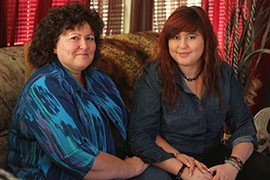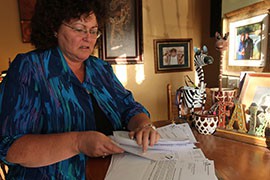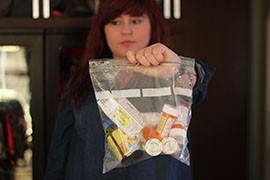Cronkite News has moved to a new home at cronkitenews.azpbs.org. Use this site to search archives from 2011 to May 2015. You can search the new site for current stories.
Dropped by state, left out of ‘Obamacare,’ family struggled for health care
WASHINGTON – Things looked bad in January when Mikayla Perez, a Tucson teen with lupus, lost her health coverage after the state of Arizona canceled KidsCare II, part of its children’s health insurance program.
And things were about to get worse.
Dropped from the state plan for low-income kids, the Perezes learned they made too much money to qualify for the state’s Medicaid program, which had picked up about 23,000 KidsCare II kids.
Insurance for the whole family through father Frank’s workplace was too expensive. But because he had a plan at work, a wrinkle in the Affordable Care Act put coverage under Obamacare similarly out of reach.
So Frank chose to cut his pay this year so the family could come in under the state’s Medicaid income limits – only to have their paperwork botched twice by the state.
“It’s devastating for us,” said Mikayla’s mother, Carla. “It’s devastating when she says she doesn’t feel good and we don’t know what to do.”
So they kept trying, in hopes of getting their daughter “affordable” care.
That care finally arrived last week, when the family got a letter saying they had been enrolled in the Arizona Health Care Cost Containment System – the state’s version of Medicaid. But not before months of work and worry.
“Really, we just need to worry about between now and then,” Carla said, before the AHCCCS enrollment was approved. “But that’s a big worry if she has to go into the hospital every few months.”
Mikayla was diagnosed at age 16 with lupus, a systemic autoimmune disease that attacks her joints and tissues. Now 17, she takes 10 different prescriptions every day to help keep the symptoms of lupus in check – a few for the pain, one for her stomach, a dose of steroids to keep her strong.
Ten pills in the morning. Another set of four pills at night.
“I used to be afraid of taking pills, so I would only take one at a time. But with this whole thing, I’m able to take a big handful of pills and just throw them in my mouth and take them all at once,” she joked.
But without all those medications, Mikayla could end up in the hospital, like she did in early April after attending a church campfire.
“Maybe once every two months she’ll have a morning that she forgets to take her pills, and the next day she pays the price for it. She’s so sick,” Carla said. “For her to even go two or three days without it, it can’t happen.”
Affording Mikayla’s prescriptions has been a struggle since she was dropped from KidsCare, which had a monthly premium but no other costs. Medicaid, now that they are enrolled, will cover her prescriptions; plans they might get through Obamacare might not.
Joe Fu, health policy director for the Children’s Action Alliance, said the Arizona child advocacy group helped research the impact of moving kids with different health statuses from KidsCare to the federal marketplace. The findings of that research, released Thursday with the Georgetown University Center for Children and Families, said that even without factoring in premiums, the cost-sharing alone in federal marketplace plans make them more expensive than KidsCare in nearly all cases.
“A lot of these families and kids are going to experience a huge cost difference between their KidsCare plans and marketplace plans, if they do choose to go that route,” Fu said. “The co-pays, the coinsurance costs, the medication costs, all of those things are going to add up really quickly for these families.”
Even if they could afford an Obamacare plan, the Perezes quickly learned that that was not an option.
“They keep telling me, ‘Go through the marketplace,’” said Carla. “Everyone. I try to talk to people. ‘Go to the marketplace. Go to the marketplace’
“I have been to the marketplace. … I applied on the marketplace and they denied us the subsidies because my husband has insurance through his work.”
The Perezes have been caught by what experts call the “family glitch.” Designed to keep workers from ditching employer-provided health insurance for federally subsidized marketplace plans, the Affordable Care Act requires employees to keep “affordable” workplace plans – costing no more than 9.5 percent of income – or forfeit subsidies that would make marketplace plans cheaper.
But the law did not account for families, said Bruce Lesley, president of First Focus, a child advocacy group based in Washington, D.C.
“The cost for a family plan could be triple or more of that of the employee,” Lesley said. “So it may only be 8 percent of income for the employee, but it could be more than 25 percent of their income for a family, which makes it unaffordable.”
The glitch has affected families nationwide, but may be made worse in Arizona because of the state’s frozen children’s health insurance program, experts said.
For the Perez family, putting Mikayla on her dad’s workplace insurance would add almost $200 to the monthly premiums that they already pay.
Mikayla should be getting her blood work done on a monthly basis, along with regularly visiting a rheumatologist. But since she was dropped from KidsCare, she has only been to the doctor once – an emergency room visit in April after the church campfire.
“So we sit here with a chronically ill child. If she was a normal teenager and just needed her yearly physical, the marketplace would be perfect,” Carla said. “But when you get through making all the co-pays, and paying for the policies, we can’t afford it. And that’s the bottom line.”
Carla remembers being excited when the Affordable Care Act passed.
“I told my husband, ‘We’re finally going to be able to have insurance,’” she said.
Carla still supports the law, but she doesn’t think every situation was considered when it was passed.
For a family excluded from Obamacare, the barrage of health care advocates pushing the plan has become a constant reminder of what they can’t have.
“All I hear is, ‘Go to the marketplace.’ And I hate hearing those words,” Carla said.
“I don’t even answer my phone. I get constant calls from health agents and health representatives, and I don’t even answer them,” she said. “I get stuff in the mail and I just tear them up and throw them away.”
The Perezes thought they had a solution when Frank cut his hourly wages as a painter so they could apply to AHCCCS.
But while Mikayla was in the hospital in April, Carla found out that AHCCCS had denied them coverage because it didn’t have all their paperwork. She raced home to resubmit the application, including a new pay stub reflecting Frank’s lower wages. In mid-April, the family was denied again – for making too much money, even though Carla had turned in paperwork showing the lower income.
“Nobody at the AHCCCS office ever bothered, in the last two applications that we filled out, to look at the downloads that they had to have, supposedly,” Carla said. “They just went by his old income, and they denied us twice.”
An AHCCCS spokeswoman blamed the family’s denial on a simple computational error that has since been corrected. The agency has since worked directly with the family to get them enrolled.
“It just captured the previous income information rather than the new income change that they reported,” said Jennifer Carusetta, chief legislative liaison for AHCCCS. She added that applicants are “always welcome” to notify AHCCCS if they believe they were wrongly denied.
That was not exactly at the top of the daily to-do list for the Perez family. Neither was battling glitches in the Affordable Care Act.
“I feel like I’m a puppet. And if I don’t stay on top of this and constantly call them and constantly pursue this, they don’t care,” Carla said. “Yeah, we can go to the marketplace, but those of us that have the chronically ill (children) and the children that are dying, that doesn’t help us.”
Carla said this week that she was glad her family’s situation was resolved, but she still plans to push the state to re-implement KidsCare.
“I’m glad they have the AHCCCS program, but I really want to fight to get the KidsCare program back,” Carla said. “That’s what this is about, really.”
Mikayla said she’s ready to join that fight, to help other kids.
“This wasn’t all supposed to be about my problems. I wanted it to be about the other kids, too,” Mikayla chimed in. “I’m glad that my mom is still pushing for them, and I’ll be by her side if she needs me.”










